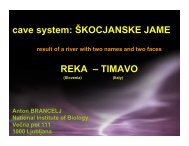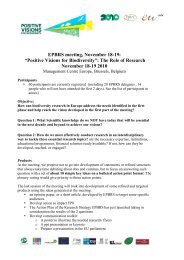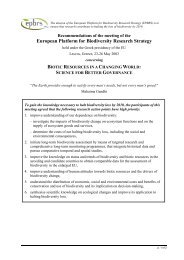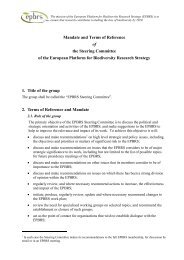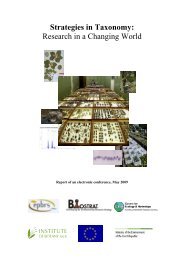Evaluation of the effectiveness of the New Instruments of ... - CORDIS
Evaluation of the effectiveness of the New Instruments of ... - CORDIS
Evaluation of the effectiveness of the New Instruments of ... - CORDIS
You also want an ePaper? Increase the reach of your titles
YUMPU automatically turns print PDFs into web optimized ePapers that Google loves.
Dissatisfaction with <strong>the</strong> feedback on evaluation results<br />
Feedback is sent to participants as an “evaluation summary report” (ESR). The general<br />
perception is that <strong>the</strong>se are <strong>of</strong> very variable quality which can be explained in part by <strong>the</strong><br />
choice <strong>of</strong> evaluators and in part by <strong>the</strong> fact that <strong>the</strong> short ESR does not reflect <strong>the</strong> work done<br />
during <strong>the</strong> evaluation process.<br />
Extract from <strong>the</strong> report on <strong>the</strong> survey among participants (annex 2):<br />
The high level <strong>of</strong> dissatisfaction regarding <strong>the</strong> process transparency is surprisingly high for<br />
successful proposers. This is a sign that <strong>the</strong>re is still significant room for improvement.<br />
The following elements notably are criticised,(significantly higher (very) negative scores):<br />
• <strong>the</strong> transparency <strong>of</strong> <strong>the</strong> evaluation process : 34 % <strong>of</strong> <strong>the</strong> respondents (strongly) disagree<br />
that <strong>the</strong> evaluation process is fully transparent;<br />
• <strong>the</strong> smoothness and efficiency <strong>of</strong> <strong>the</strong> contract negotiation : 31 % <strong>of</strong> <strong>the</strong> respondents<br />
(strongly) disagree that this process was smooth and efficient;<br />
• <strong>the</strong> comprehensiveness <strong>of</strong> <strong>the</strong> feedback : 27 % <strong>of</strong> <strong>the</strong> respondents declared not to be<br />
satisfied (at all) with <strong>the</strong> comprehensiveness <strong>of</strong> <strong>the</strong> feedback received on <strong>the</strong> evaluation <strong>of</strong><br />
<strong>the</strong>ir proposal.<br />
Independently <strong>of</strong> <strong>the</strong> perception <strong>of</strong> quality, <strong>the</strong>re is a general feeling <strong>of</strong> lack <strong>of</strong> adequacy<br />
between <strong>the</strong> investment in a proposal and a one page feedback, which is <strong>the</strong> usual format <strong>of</strong><br />
an evaluation summary report (ESR). The content does not necessarily allow for<br />
unsuccessful proposers to learn from <strong>the</strong>ir experience and improve for a possible resubmission.<br />
Although <strong>the</strong> current evaluation process has been praised in different priority<br />
areas, it does not seem to be very efficient to build up trust.<br />
Doubts exist on adequate selection and training <strong>of</strong> evaluators<br />
The hearings have shown that <strong>the</strong>re are sometimes strong doubts on <strong>the</strong> quality <strong>of</strong><br />
evaluators. Improvements mentioned include <strong>the</strong> need to select real experts on <strong>the</strong> given<br />
topic, <strong>the</strong> need for evaluators to be properly trained and to have sufficient time to evaluate<br />
very long and complex proposals.<br />
Hearings are useful but could be more user-friendly<br />
When hearings were used, this is generally perceived as a positive technique by <strong>the</strong><br />
proposers as well as <strong>the</strong> programme managers and evaluators. The way it is implemented by<br />
some Priority Thematic Areas was however very rigid and is being criticized by proposers as<br />
no real dialogue or discussion between well prepared evaluators and proposers was<br />
possible.<br />
Statements from participants<br />
“We were shocked by <strong>the</strong> lack <strong>of</strong> competence and <strong>the</strong> poor, on some points, clear<br />
misjudgments <strong>of</strong> <strong>the</strong> evaluators.”<br />
“The cryptic feedback allows nei<strong>the</strong>r to understand <strong>the</strong> decision, nor to prepare a better<br />
submission in future.”<br />
“You cannot expect that researchers who worked for months on a 200 page proposal can be<br />
satisfied with only one or two lines <strong>of</strong> comments on each <strong>of</strong> <strong>the</strong> 5 criteria.”<br />
17



